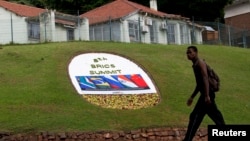DURBAN, SOUTH AFRICA —
At just five-years old, the BRICS economic bloc is defining its role at a summit in South Africa. Group members Brazil, Russia, India, China and South Africa are meeting to lay the foundation for a development bank, but activists are urging them to enter the political realm.
BRICS’ main focus is business, which was obvious Tuesday as businessmen in suits manned booths at the Durban exhibition center, touting everything from wine to diamonds to missiles.
These men are not here just to talk, they said, and neither are the well-suited political leaders who will follow Wednesday. Those heads of state plan to establish a BRICS development bank that could serve as a counterweight to the powerful, but entrenched lending institutions like the World Bank and the International Monetary Fund.
BRICS Factbox
BRICS- The world's five largest emerging economies: Brazil, Russia, India, China, South Africa
- Total population of BRICS nations is almost 3 billion people
- Total BRICS GDP is $14 trillion
- The fifth annual BRICS summit starts March 26 in Durban, South Africa
BRICS is a relatively recent arrangement, but the economies of the five nations - Brazil, Russia, India, China and South Africa - are booming relative to the traditional economic powers. The group is collectively worth more than a quarter of the world’s GDP.
But humanitarian organizations are calling for the group to use that economic muscle for a political cause. Activists met Monday in Johannesburg to call for the BRICS nations to speak out against atrocities in Syria.
The five nations have previously said they oppose foreign intervention in Syria, and Russia, China and South Africa have voted against resolutions on Syria at the U.N. Security Council.
Aid group Doctors Without Borders said it would like to see BRICS use its weight to press for humanitarian access to Syria.
The aid group’s South Africa director, Daniel Berman, said “We think that it is unacceptable that the issue of Syria is not firmly on the agenda. And that this group of emerging countries which have considerable global power are not using their might to negotiate some humanitarian aid in Syria.”
Analyst Simon Freemantle of South Africa’s Standard Bank says BRICS is likely to say something about Syria, but that it will not be a dramatic statement or influence business.
“I think they will be expressing solidarity for some of the victims of the violence there, they will advocate for the peaceful resolution to continue to be pursued ... I do not perceive the BRICS to start to become a very dramatic interventionist foreign policy mechanism, that is unlikely to happen for some time," he said.
The South Africa-based CEO of the NEPAD Business Foundation, Lynette Chen, says a coordinated stance is not necessarily a bad thing for business and can make a difference as long as the BRICS nations stick to one stance. NEPAD, the New Partnership for Africa’s Development, works to foster business within Africa.
“I think the BRICS grouping will definitely alter the global playing field. So, if you have the BRICS countries sticking together, for example, on issues like Syria, in example, in the U.N. Security Council, for example,I think that you will see more of a concerted effort around interventions in these situations," she said.
The summit continues Wednesday.




